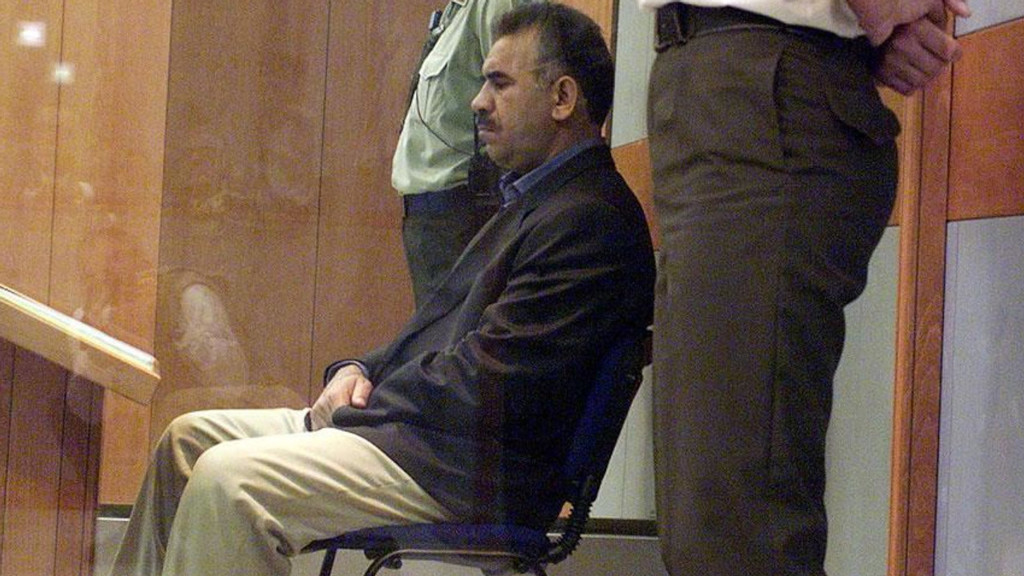The pro-Kurdish Peoples’ Democratic Party (HDP) has called on Turkish authorities to end the prison restrictions imposed on the leader of the outlawed Kurdistan Workers’ Party (PKK) and allow him to exercise his legal rights, the Mezopotamya news agency reported.
PKK leader Abdullah Öcalan was captured in 1999 by Turkey’s secret service in Kenya and sentenced to death, although the sentence was commuted to life imprisonment in 2002 when Turkey abolished the death penalty.
He has been jailed in a high-security prison on İmralı Island in the Sea of Marmara since 1999, where he has been unable to see his lawyers and family members for several years.
The party’s law and human rights commission released a written statement on Monday, saying that Öcalan has been held in solitary confinement since his imprisonment in 1999 and is prevented from exercising his rights in violation of the law.
Tecride son verin, Öcalan’ın avukatlarıyla görüşmesini sağlayın!
Hukuk ve İnsan Hakları Komisyonumuzun açıklaması:https://t.co/QbP83HkJSR
— HDP (@HDPgenelmerkezi) August 7, 2023
The party said Öcalan has been unable to meet with his lawyers since 2019 and that his lawyers’ attempts to secure permission from Turkish authorities to visit him have been rejected without any legal basis for years.
HDP said Öcalan was last able to meet with his lawyers in person on İmralı Island on Aug. 7, 2019, while inmates Hamili Yıldırım, Ömer Hayri Konar and Veysi Aktaş have not been allowed to meet with their lawyers at all since they were transferred to the island in March 2015.
The other inmates on the island were also convicted on terrorism charges related to the PKK and had been given aggravated life sentences.
The last time Öcalan’s lawyers heard from him was on March 25, 2021, when his brother, Mehmet Öcalan, was allowed to have a brief phone call with him, which, according to his lawyers, was suddenly cut off.
At the time Mehmet Öcalan said his brother told him the government should allow him to visit with his lawyers and family in person in line with his rights.
The phone call took place at a time when there were rumors about Öcalan’s detoriorating health in prison.
The party recalled a report issued by the Council of Europe’s Committee for the Prevention of Torture and Inhuman or Degrading Treatment or Punishment (CPT) in August 2020 which found the restrictions imposed on Öcalan and a handful of other inmates in the island prison not acceptable and urged Turkish authorities to grant Öcalan more outside contact and less solitary confinement.
The CPT lamented an almost total absence of family visits in recent years to Öcalan and the turning down of requests for visits from his lawyers since 2019.
“A balance must be struck between such security considerations and the basic human rights of the prisoners concerned,” it said, calling for a “sustainable system” of regular visits by family members and lawyers at İmralı.
According to the HDP, the jail restrictions imposed on Öcalan can be explained by the government’s determination not to resolve the Kurdish issue since Öcalan’s situation aggravates the Kurdish issue and dashes hope for its peaceful resolution.
The Kurdish issue, a term prevalent in Turkey’s public discourse, refers to the demand for equal rights by the country’s Kurdish population and their struggle for recognition.
The Turkish government held direct talks with Öcalan and the PKK as part of a peace process initiated in 2009, in a bid to end the country’s Kurdish conflict that has claimed more than 40,000 lives. The talks collapsed in 2015. The PKK, which has been waging an armed conflict against the Turkish state since 1984, is designated as a terrorist group by Ankara and much of the international community.
In late June a Turkish court arrested Merdan Yanardağ, the editor-in-chief of TELE1 station, over televised remarks criticizing the restrictions imposed on Öcalan, for which Yanardağ said there were no legal grounds.
Yanardağ, who was indicted last month, faces a prison sentence ranging from one year, six months to 10 years, six months, on charges of “praising crime and a criminal” as well as “disseminating propaganda for a terrorist organization.”



